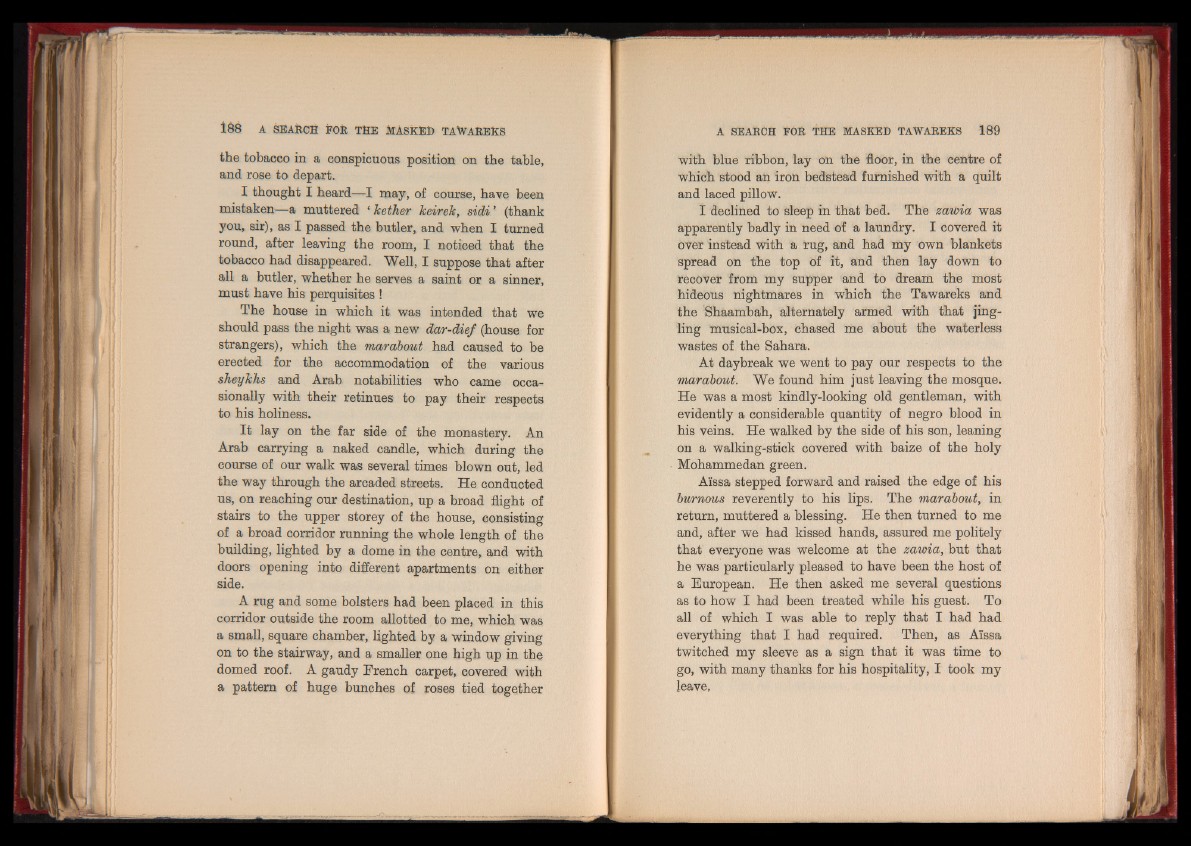
the tobacco in a conspicuous position on the table,
and rose to depart.
I thought I heard—I may, of course, have been
mistaken—a muttered * kether keirek, sidi ’ (thank
you, sir), as I passed the butler, and when I turned
round, after leaving the room, I noticed that the
tobacco had disappeared. Well, I suppose that after
all a butler, whether he serves a saint or a sinner,
must have his perquisites !
The house in which it was intended that we
should pass the night was a new dar-dief (house for
strangers), which the marabout had caused to be
erected for the accommodation of the various
sheykhs and Arab notabilities who came occasionally
with their retinues to pay their respects
to his holiness.
It lay on the far side of the monastery. An
Arab carrying a naked candle, which during the
course of our walk was several times blown out, led
the way through the arcaded streets. He conducted
us, on reaching our destination, up a broad flight of
stairs to the upper storey of the house, consisting
of a broad corridor running the whole length of the
building, lighted by a dome in the centre, and with
doors opening into different apartments on either
side. A rug and some bolsters had been placed in this
corridor outside the room allotted to me, which was
a small, square chamber, lighted by a window giving
on to the stairway, and a smaller one high up in the
domed roof. A gaudy French carpet, covered with
a pattern of huge bunches of roses tied together
with blue ribbon, lay on the floor, in the centre of
which stood an iron bedstead furnished with a quilt
and laced pillow.
I declined to sleep in that bed. The zawia was
apparently badly in need of a laundry. I covered it
over instead with a rug, and had my own blankets
spread on the top of it, and then lay down to
recover from my supper and to dream the most
hideous nightmares in which the Tawareks and
the Shaambah, alternately armed with that jingling
musical-box, chased me about the waterless
wastes of the Sahara.
At daybreak we went to pay our respects to the
marabout. We found him just leaving the mosque.
He was a most kindly-looking old gentleman, with
evidently a considerable quantity of negro blood in
his veins. He walked by the side of his son, leaning
on a walking-stick covered with baize of the holy
Mohammedan green.
Aissa stepped forward and raised the edge of his
burnous reverently to his lips. The marabout, in
return, muttered a blessing. He then turned to me
and, after we had kissed hands, assured me politely
that everyone was welcome at the zawia, but that
he was particularly pleased to have been the host of
a European. He then asked me several questions
as to how I had been treated while his guest. To
all of which I was able to reply that I had had
everything that I had required. Then, as Aissa
twitched my sleeve as a sign that it was time to
go, with many thanks for his hospitality, I took my
leave,